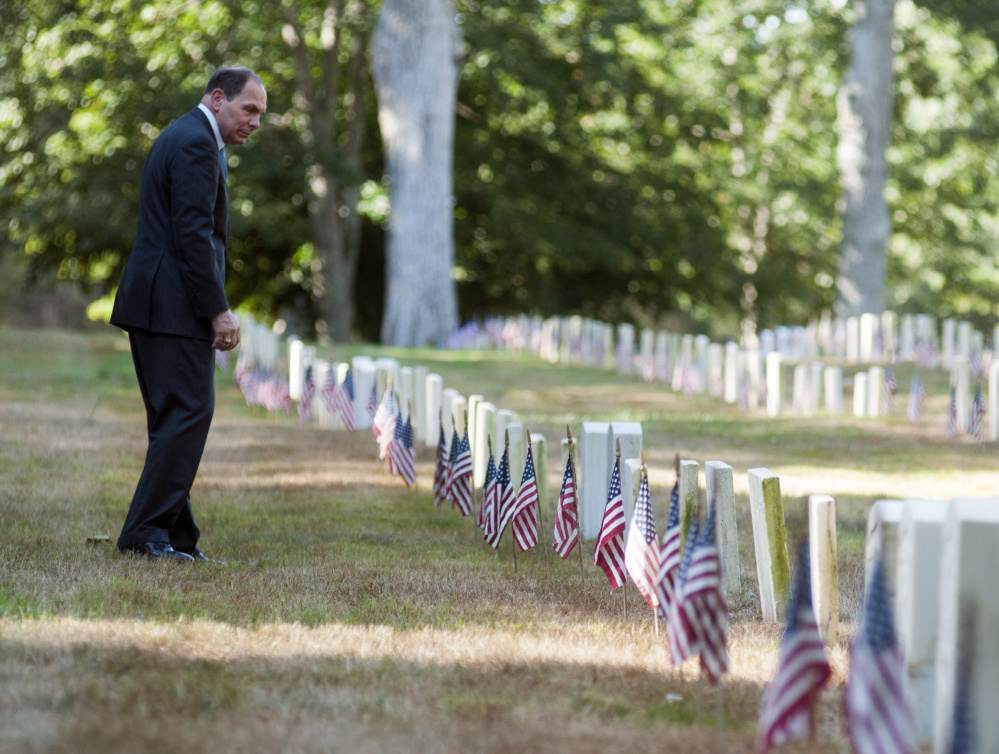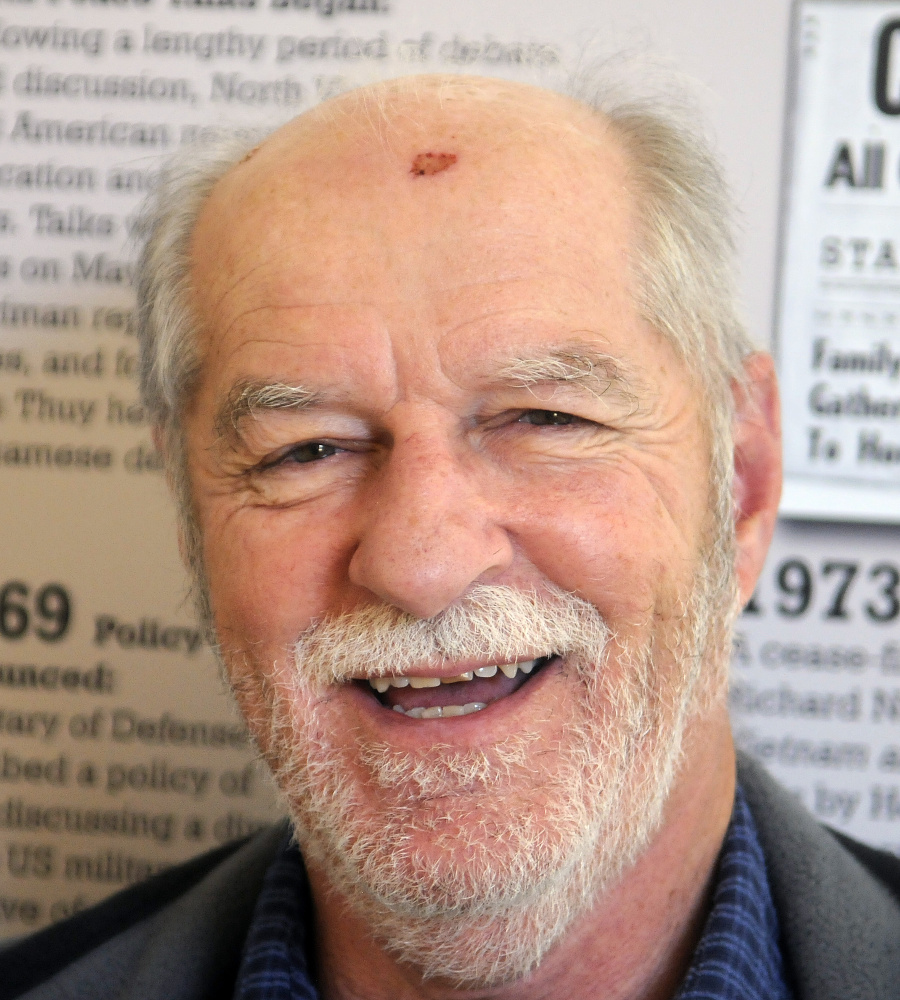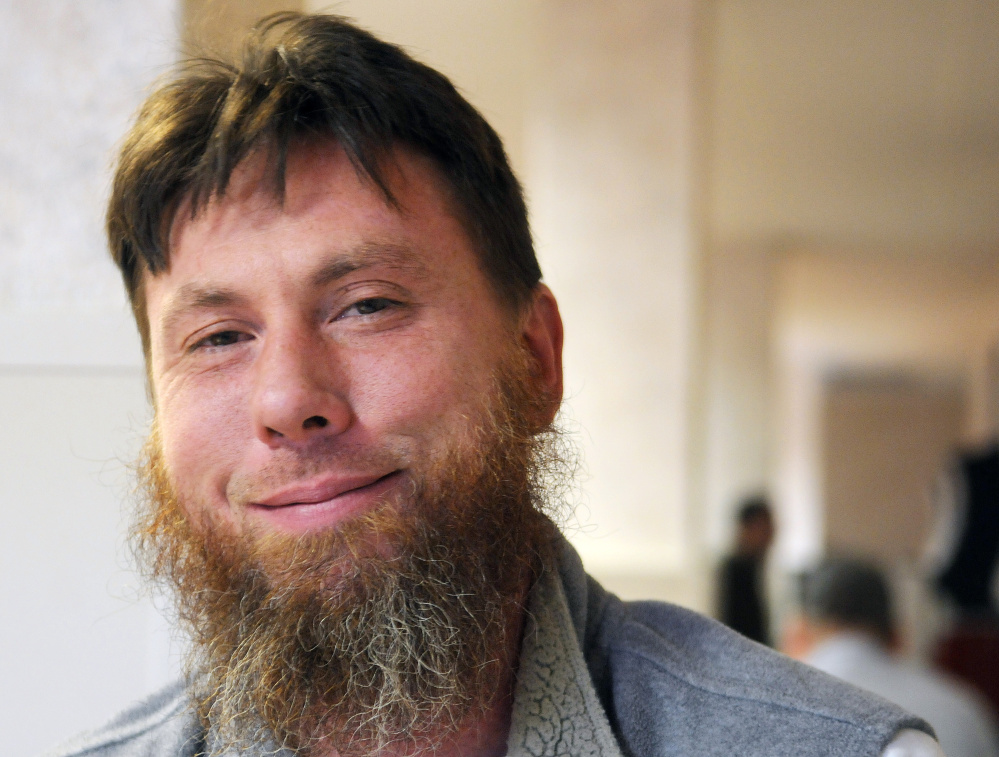Jason McFarland, a 36-year-old Army veteran who served two tours in Afghanistan and now lives in Augusta, didn’t like some comments Donald Trump made about veterans during his campaign for president, but he still supported the Republican.
He feels the president-elect will improve the business climate in the country, reduce the national debt and support the armed services better than past administrations, especially considering the support his policies will receive in the House and Senate, both of which are controlled by Republicans.
“I really think he’s going to bring us hopefully forward,” McFarland said.
Interviews with Maine veterans and at least one exit poll suggest that McFarland wasn’t alone: many other veterans voted for Trump, contributing to the businessman and reality television star’s victory in the general election over his Democratic rival, Hillary Clinton.
Of the more than 3,000 veterans polled by CNN on Tuesday, about two-thirds said they voted for Trump.
“Most of (the veterans I know) are pleased that he was elected,” said Jerry Dewitt, commander of the American Veterans Department of Maine, the state chapter of a national, nonprofit organization that advocates for veterans.
POLICY SHIFT?
Veterans affairs was not the most discussed issue of the 2016 presidential race, but in the months leading up to Tuesday’s vote, both Trump and Clinton did offer general platforms for reforming the Department of Veterans Affairs, the federal agency that oversees Togus and hundreds of other facilities around the country.
After widespread reports two years ago about delays at veterans hospitals, both candidates said the agency needs to be overhauled. But whereas Clinton wanted to block any efforts to privatize veterans care, Trump said he would ensure that veterans can seek care from either federal or private service providers. Trump also said he would weed out “corruption” in the veterans department, replacing its top administrators, including Secretary Robert McDonald, and creating a commission to investigate fraud and wrongdoing.
Trump’s proposals have appealed to several advocates in Maine, including Gary Laweryson, a retired Marine from Waldoboro who is chairman of the Maine Veterans Coordinating Committee.
Laweryson praised the staff and administrators at Togus, including Director Ryan Lilly.
But he said top officials in the veterans department have grown increasingly disconnected from the people they serve over the last 20 years, leading to benefits programs that don’t reward long-term commitments to the military and make it less appealing for young Americans to enter the service.
“The hierarchy has got to change and I see Trump changing that,” Laweryson said. “Not in one fell swoop, but he’s going to change it.”
Trump’s lack of political experience “is to his benefit,” Laweryson added. “He hasn’t had to get in bed with these people. Some of them have been there way too long anyways. And (Trump) has good people around him. The vice president there (Mike Pence), I think he’s a cracker-jack.”
While advocates generally agree that Togus performs well as a health care system, it has not been immune from the challenges that have affected other VA systems.
A report released in June 2015 by the VA Office of Inspector General linked the VA Maine Healthcare System to “nationwide systemic problems” that led either to long waiting periods for veterans seeking mental health services or to not receiving them at all because of inappropriate scheduling processes or other problems.
The eight-month investigation identified problems in staffing levels and employee morale in the mental health unit, but failed to substantiate many allegations that led to the investigation. It also found no indication of scheduling shortcuts to meet the wait-time benchmarks sent by the VA, which was found to be a pervasive practice in the VA system.
By the time the report was released, VA Maine Healthcare already was adding 40 staff members, 17 of whom were to be working in mental health services. Funding for the additional staff was included in the Veterans Access, Choice and Accountability Act, which was intended to overhaul veterans’ health care and eliminate long waiting periods by allowing veterans to get care outside the VA system in some instances.
But there are still delays in the system, said Dewitt, and he hopes that a Trump administration can improve the access by veterans to health care services, whether from VA or private providers. The fact that Republicans control both houses of Congress should help Trump get his proposals passed, Dewitt said.
“Now it’s time to put his money where his mouth is,” Dewitt added. “He has good ideas, but if he don’t do what he says he’s going to do, he won’t get re-elected.”
Lilly, director of Togus, declined to comment on how Trump’s presidency could affect the system. He referred to the Hatch Act, a law that prohibits federal employees from discussing politics. But Lilly did say Togus officials would implement whatever changes are mandated by Congress or the executive branch.
TOUGH RHETORIC
Trump received support from many veterans despite making several critical comments about veterans and their families during his campaign.
In one case, Trump denied the heroism of Sen. John McCain, a Navy pilot who spent more than five years in a prisoner-of-war camp after his plane was shot down during the Vietnam War. “He’s not a war hero,” Trump said last summer. “He’s a war hero because he was captured. I like people who weren’t captured.”
In another, Trump attacked Khizr and Ghazala Khan, the parents of a captain in the U.S. Army who was killed in Iraq, after they campaigned for Clinton.
Not all veterans tolerated Trump’s attacks.
Gregory and Debra Couture, of West Gardiner, who are both 63-year-old Navy veterans, said they voted for Clinton partly as a reaction to offensive comments Trump made about veterans, women and people with disabilities. The Coutures receive care at the Togus campus of the VA Maine Healthcare System and were there Thursday for a celebration of the facility’s 150 years.
“I’m a Republican,” Debra said. “I was a convert. I feel like with women and how far they have come, (Trump) sets us back 50 years. And the way he imitated a disabled person? I have a disabled grandchild.”
But this week, other veterans said Trump’s statements shouldn’t necessarily reflect his commitment to the country, the military and those who have served in it.
“Trump sometimes lets his mouth run before his brain engages and that’s unfortunate,” Dewitt said, “but I think he’ll go back and reach across the aisle and sit down with John McCain.”
Ralph Bond, a 93-year-old Jefferson resident, now gets treatment at Togus for hearing loss he suffered from 1943 to 1945, while he worked on training planes for the U.S. Air Force.
“We had no protection at all,” he said of his work on the BT-13 trainer aircraft. “They made a terrible noise.”
Bond voted for Trump, he said, because he hopes the president-elect can reduce the national debt and make VA care more efficient.
For the Coutures, part of the consideration is whether Trump can work with others.
Gregory, a selectman in West Gardiner, questioned how Trump will be able to work with Congress to keep federal funds coming.
“I had some level of confidence about how (Clinton) was going to act with Congress because she used to be (a senator),” he said. “I don’t know what (Trump’s) going to do.”
Charles Eichacker — 621-5642
Twitter: @ceichacker
Send questions/comments to the editors.







Success. Please wait for the page to reload. If the page does not reload within 5 seconds, please refresh the page.
Enter your email and password to access comments.
Hi, to comment on stories you must . This profile is in addition to your subscription and website login.
Already have a commenting profile? .
Invalid username/password.
Please check your email to confirm and complete your registration.
Only subscribers are eligible to post comments. Please subscribe or login first for digital access. Here’s why.
Use the form below to reset your password. When you've submitted your account email, we will send an email with a reset code.